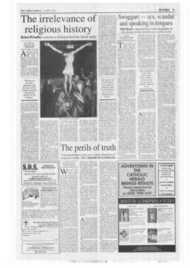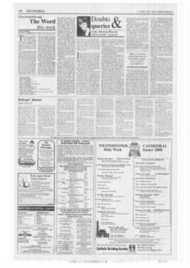Page 7, 14th April 2000
Page 7

Report an error
Noticed an error on this page?If you've noticed an error in this article please click here to report it.
Tags
Share
Related articles
The Galileo Case
From Dr W E Makin Sir, Peter Hodgson Tells Us
The Trial Of Galileo
Science And Faith
Truth In Theology And Science
Science and theology
From Mr D J Taylor Sir, Dr W Makin's spirited defence of Mary Kenny was spoiled both by flawed argument and by it becoming a personal attack on Peter Hodgson.
There is of course a difference between calling Mary "outrageous" and saying that her remarks sometimes are.
I myself have several times felt outraged by her remarks — not so much by the opinions as by the too often unfounded air of "author ity" with which she presents them.
As for Dr Makin's definition of science, it reminded me of Humpty Dumpty's declaration in Through the Looking Glass: "When I use a word, it means just what I choose it to mean — neither more nor less". So Galileo couldn't be a scientist until he had peers to judge him. Rubbish!
How could science ever have got started if that were the case?
The difference between a scientist and a theologian is that the one judges his hypotheses against the evidence provided by nature, the other judges them against revelation.
The non-scientist relies on his senses, common sense and the often untested opinions of others.
It is when he comes to communicate his science that the scientist needs the authoritative support of his peers — which, in the case of new discoveries is still not always forthcoming. One can make a positive argument from that, however, along the lines of "tempering the metal".
Yours faithfully, D.J TAYLOR Malvern Link, Worcs.
blog comments powered by Disqus













